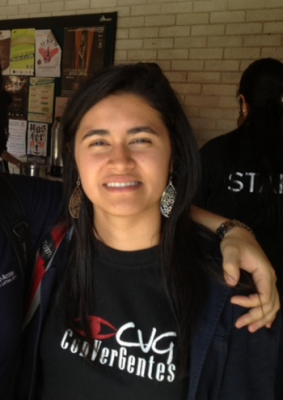A group of young people from La Loma community in the outskirts of Medellin decided to report the environment of their neighborhood through text, multimedia and videos. From stories of violence, to the every day life in this Colombian comuna, the blogging project they started was called HiperBarrio.
 Yesenia Corrales, the project coordinator and a native from the barrio, decided to study library science from her experiences working with digital alphabetization in her community. In the following interview, Corrales tells us more about the start and the current status of the project, the context of the La Loma area, challenges to the project, and how blogging has had an important impact on her community.
Yesenia Corrales, the project coordinator and a native from the barrio, decided to study library science from her experiences working with digital alphabetization in her community. In the following interview, Corrales tells us more about the start and the current status of the project, the context of the La Loma area, challenges to the project, and how blogging has had an important impact on her community.
What is HiperBarrio?
HiperBarrio is the organization within our local libraries; it is how we began converging and replicating our meetings, expressing ourselves and publishing on the web.
After HiperBarrio, we started Convergente – a non-profit. With the projects we began to teach people to use web tools. It began as an idea from the libraries, but now those tools are transmitted and replicated in other communities. We found out that this works best when more people come together; you learn as a team. We realize that this works as long as the community cares.
What is La Loma?
It is part of “comuna 60”, a municipality of the city of Medellin. It is located northwest of the city. La Loma (or “The Hill” in English) is a village that has been culturally known through local history, in the sense that people have driven culture as a comic opera piece, where men dress as women.
In this comuna there are 24 thousand inhabitants, many of them are single mothers. It looks like it is in Medellin. It is close enough, only 40 minutes from the city of Medellin. La Loma is divided into sectors. There are violence problems in its invisible borders. If you're from one sector, is dangerous to go into other sectors. There is someone who has power in each sector.
Still, there are groups of young people who make hip-hop, like other young people who are starting things. We have a school of music in the area, and people like to dance.
How did you get involved with the project HiperBarrio?
When we started our workshops we began to understand the region where we were. We wanted to know what else was happening in our country, and in our community. Then the opportunity [microgrant] from Rising Voices came, and a volunteer came to teach us how to blog. After learning, we formed teams and our personal space got extended into a virtual one, where we posted our texts and images, and there was an audience that was reading us.
Then the workshops became an excuse for us to get together – a group of people that had the same interests. We felt we were convergent – and we kept on seeing each other to discuss community violence or read poetry, moonlit walks through our territory and getting to know our characters.
Tell us more about the activities you do with “convergente” project.
I work on the weekends with our “convergente practices”, we organize workshops on farming and agricultural practices in the cities. We follow three lines and one of them is technology. With it we are exploring photography and we also started using OpenStreetMap, to make positioning exercises. La Loma did not appear on the maps before. Another activity was balloon mapping, when our photographs are taken aerially. We solidified this model for mapping, with similar practices in the “Colombia Campus Party.”
We want to continue “training trainers”, as it is always fun. We want to give workshops to Afro-Peruvian communities.
How are blogs helping your community?
Blogs have helped us making our stories visible. It's been a process of showing what happens beyond the invisible, creating personal boundaries, manifesting us in a personal level. A place for other people interested in what we publish.
As a blogger, have you faced any problem or danger?
Only once we had a hacking attack, and then we could not publish or enter the site. For me, this was a demonstration that people are reading us.
How has Rising Voices helped you and your project?
Personally, it has helped me understand that there are other audiences. When they gave me the opportunity to get out and see another country, the world and its possibilities opened for me. It also helped me to reaffirm my interest in social issues. Also, writing as a reflective act, makes me feel free. It has been a place to see how we can help others.”
Thinking about it, I should mention it also helped to continue forming ideas, guiding people and becoming an example of an alternative path for many, as sometimes youth are not willing to get different information. Young people come with fear from violent spaces, and some realize that writing is a way of life.
Editor's note 11-06-14: Hiperbarrio is no longer active, and the group's efforts have become the non-profit Convergentes.
Support our work
Since Rising Voices launched in 2007, we’ve supported nearly 100 underrepresented communities through training, mentoring, microgrants and connections with peer networks. Our support has helped these groups develop bottom-up approaches to using technology and the internet to meet their needs and enhance their lives.
Please consider making a donation to help us continue this work.




1 comment